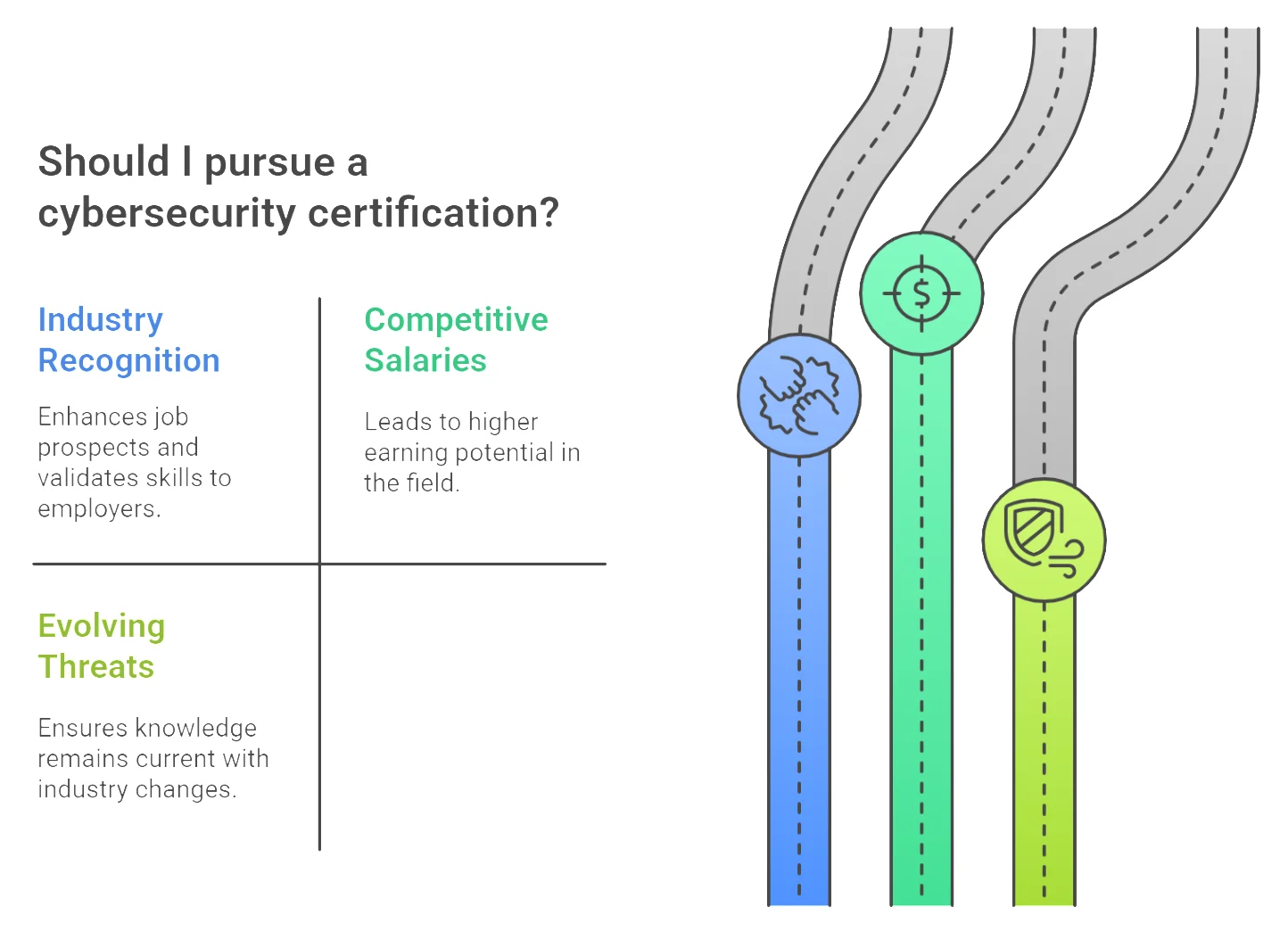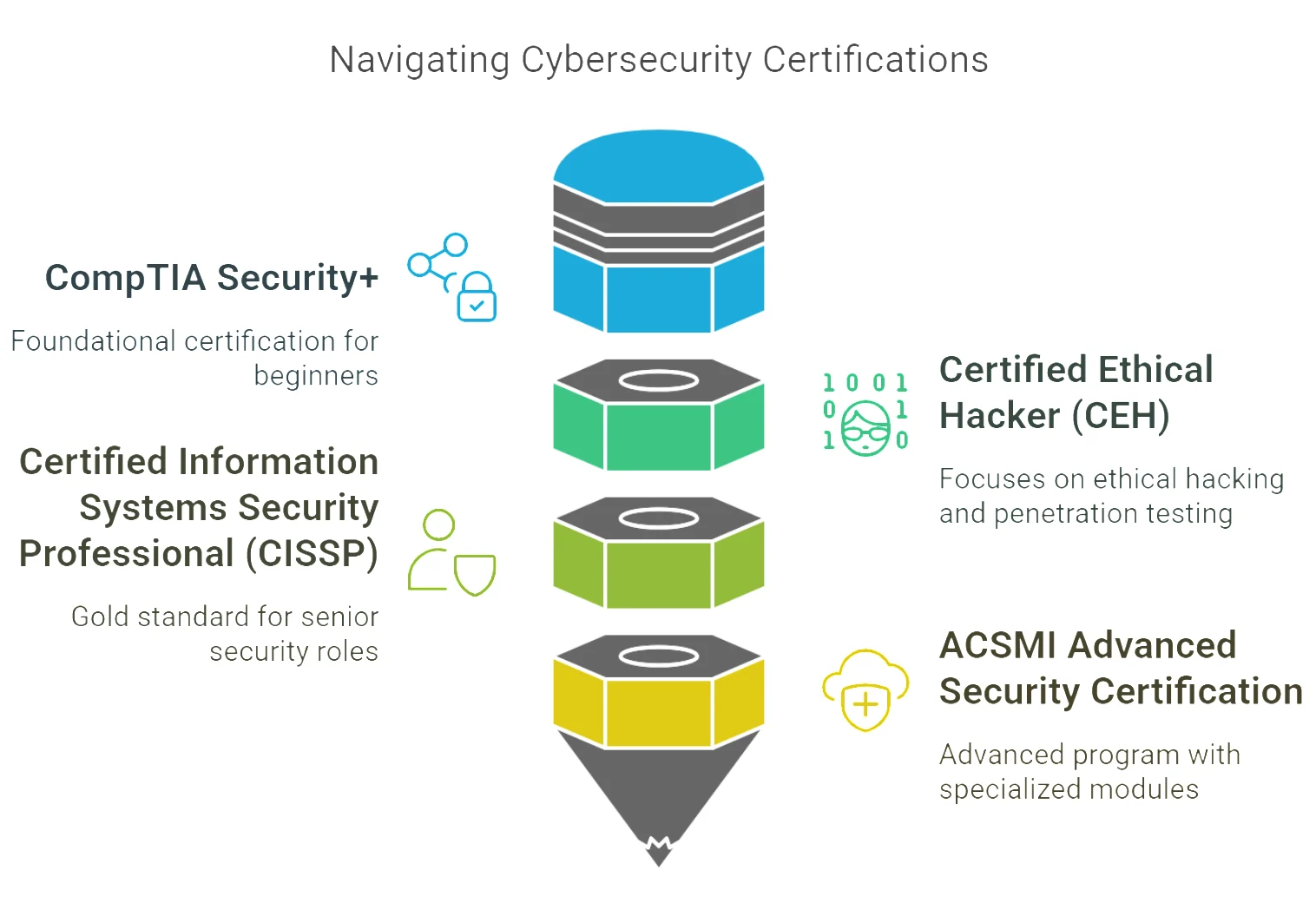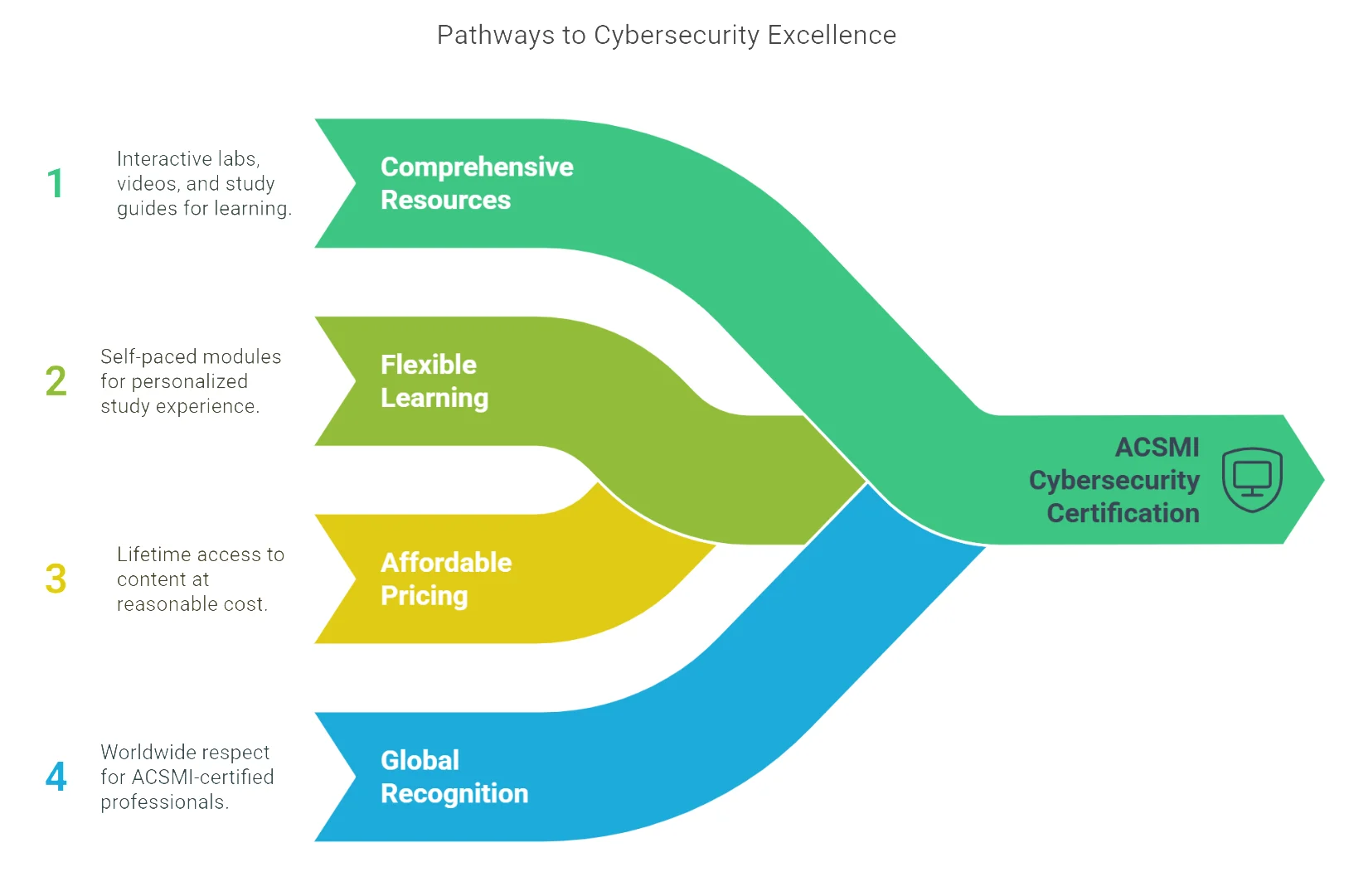Table of Contents
The cybersecurity field continues to grow at an unprecedented rate, with cyber threats becoming more sophisticated every day. From personal data theft to large-scale cyberattacks targeting businesses, governments, and individuals, the importance of cybersecurity has never been clearer. As a result, organizations are investing heavily in securing their digital environments, creating a significant demand for skilled professionals. One way to demonstrate your expertise and differentiate yourself in this competitive industry is by choosing to Get Cybersecurity Certification.
But what is the process to earn such a certification? What steps should you take to prepare, and which certifications should you prioritize? This comprehensive guide will walk you through the essentials of cybersecurity certification exams, offering strategies to help you successfully navigate the process and achieve your professional goals.
What is a Cybersecurity Certification Exam?
A cybersecurity certification exam is a formal assessment designed to evaluate an individual’s knowledge, technical abilities, and understanding of cybersecurity concepts and practices. These exams are typically administered by respected organizations like CompTIA, (ISC)², EC-Council, and ACSMI, which are globally recognized in the cybersecurity industry.
The goal of these exams is to validate your capacity to handle critical cybersecurity tasks such as:
- Identifying and mitigating cyber threats.
- Protecting network systems and data.
- Managing security policies and ensuring regulatory compliance.
Depending on the certification, exams may cover a wide range of topics, including network security, ethical hacking, incident response, risk management, and more. Once you pass, the certification serves as a credential demonstrating your competency in cybersecurity, which is highly valued by employers.
Why Take a Cybersecurity Certification Exam?

1. Industry Recognition & Job Prospects
Obtaining a cybersecurity certification is a powerful tool in today’s job market. With cyberattacks growing in frequency and severity, the demand for cybersecurity professionals is soaring. Free Cybersecurity Certification Online options help validate your skills and prove to potential employers that you can secure their systems and data effectively. Many cybersecurity roles, such as security analyst, SOC analyst, and penetration tester, require or prefer candidates with recognized credentials.
2. Competitive Salaries
Certified professionals in the cybersecurity industry are highly sought after, and they often command higher salaries than their non-certified counterparts. For example, professionals with certifications like CISSP, CEH, or ACSMI can expect significant salary increases. Entry-level positions may start at around $60,000–$80,000, with advanced roles reaching well over $200,000 per year.
3. Keeping Up With Evolving Threats
Cybersecurity is a rapidly evolving field, with new threats and vulnerabilities emerging constantly. Cybersecurity certifications ensure that professionals stay updated on the latest tools, techniques, and best practices. In fact, many certifications require periodic renewal or continuing education to ensure that your knowledge remains current with evolving threats.
Popular Cybersecurity Certifications
Choosing the right cybersecurity certification is crucial for career progression. Below are some of the most recognized and widely respected certifications in the industry, categorized based on your experience level and career goals.

1. CompTIA Security+
Ideal for beginners, CompTIA Security+ is a foundational certification that covers key cybersecurity principles. This certification is perfect for individuals new to the field who want to understand the basics of cybersecurity before advancing to more specialized topics.
- Suitable for: Beginners or those looking to enter the cybersecurity field.
- Key Areas: Network security, cryptography, identity management.
- Cost: Around $392.
2. Certified Ethical Hacker (CEH)
The CEH certification is tailored for individuals interested in ethical hacking and penetration testing. CEH teaches professionals how to think like a hacker to better defend against cyberattacks, making it one of the most popular certifications in cybersecurity.
- Suitable for: Aspiring ethical hackers and penetration testers.
- Key Areas: Hacking methodologies, vulnerability assessment, penetration testing.
- Cost: Around $1,199.
3. Certified Information Systems Security Professional (CISSP)
The CISSP certification is one of the gold standards for cybersecurity professionals. It is ideal for those seeking senior roles in security management or information security architecture. CISSP covers topics such as risk management, software security, and incident management.
- Suitable for: Experienced professionals aiming for leadership roles.
- Key Areas: Risk management, security architecture, governance.
- Cost: Approximately $749 (exam fee).
4. ACSMI Advanced Security Certification
The ACSMI certification is an advanced, comprehensive certification program that offers over 400 specialized modules. It’s perfect for those looking to dive deep into various domains like cloud security, IoT security, and advanced threat detection.
- Suitable for: Professionals seeking deep technical knowledge or leadership roles.
- Key Areas: Threat intelligence, advanced penetration testing, forensics.
- Cost: Varies based on selected modules.
How to Prepare for a Cybersecurity Certification Exam
The journey to passing your cybersecurity certification exam may seem overwhelming at first, but with the right preparation strategy, you can approach it with confidence. Here’s a step-by-step guide to help you prepare effectively:
1. Choose the Right Certification
Start by selecting a certification that aligns with your career goals. If you’re new to the field, certifications like CompTIA Security+ are excellent starting points. For those with some experience, consider certifications like CISSP or CEH for more specialized skills. If you’re unsure, ACSMI’s certification offers a wide range of modules for both beginners and experts, allowing for a more flexible learning path.
2. Study Resources and Techniques
Invest in high-quality study materials, including:
- Official study guides.
- Online courses or training sessions.
- Interactive labs and practice exams.
Platforms like ACSMI offer 400+ modules that provide hands-on training in addition to theoretical knowledge, which helps you build practical skills for real-world scenarios.
3. Practice Exams
Practice exams simulate the real test environment, helping you identify areas that need improvement. Try taking multiple practice exams before the official exam day to familiarize yourself with the exam format and question types.
4. Create a Study Schedule
Organize your study time into manageable sections. Set aside specific hours each day or week to focus on different aspects of the exam content. Consistent study is key to mastering the material.
5. Leverage Online Communities
Join forums or social media groups focused on cybersecurity certifications. These communities can provide valuable insights, study tips, and experiences from people who have already passed their exams.
6. Register and Take the Exam
Once you feel fully prepared, register for your exam through the authorized exam platform (e.g., Pearson VUE). On exam day, review all instructions, arrive early, and ensure you have everything you need for the test.
ACSMI Cybersecurity Certification – A Comprehensive Option
For those looking to gain not just a certification but practical skills applicable across a variety of sectors, the ACSMI certification stands out. This certification offers an extensive, hands-on program that is tailored to meet the diverse challenges in today’s cybersecurity landscape.

Key Features of ACSMI’s Program:
- Comprehensive Resources: Access interactive labs, video content, and downloadable study guides.
- Flexible Learning: Study at your own pace with self-paced modules.
- Affordable Pricing: Get lifetime access to updated content at a reasonable cost.
- Global Recognition: ACSMI-certified professionals are respected worldwide, making this certification a powerful addition to your resume.
Final Thoughts
Cybersecurity certifications are a powerful tool for career advancement. Whether you’re a beginner or a seasoned professional, they validate your skills, open doors to higher-paying jobs, and provide a structured path for continuous learning. With the right preparation, you can excel in the certification exams and position yourself for success in one of the most in-demand fields of today.
Start your journey today, and don’t forget to explore ACSMI’s program for comprehensive, hands-on training that will prepare you for success in the fast-paced cybersecurity world.
FAQ Section
1. Why Is a Cybersecurity Certification Important?
A cybersecurity certification validates your ability to tackle complex security tasks and enhances your job prospects. Employers trust certifications to ensure that their employees have the technical expertise to manage cybersecurity challenges.
2. How Much Time is Required to Prepare for the Exam?
Preparation time depends on the certification. Entry-level certifications can take 1-3 months of study, while advanced certifications like CISSP may take 4-6 months or longer, depending on your study pace.
3. Can I Pass a Certification Exam Without Prior Work Experience?
Yes, many certifications, such as CompTIA Security+ and ACSMI’s entry-level modules, are designed for beginners and do not require prior work experience.
4. How Do I Stay Certified After Passing?
Most certifications require recertification every 3 years, which may involve continuing education credits or retaking the exam.
5. What’s the Most Comprehensive Cybersecurity Certification?
ACSMI’s certification, with over 400 modules, offers the most comprehensive training for professionals aiming for technical excellence and leadership roles.

Leave a Reply